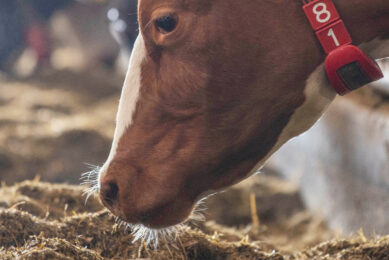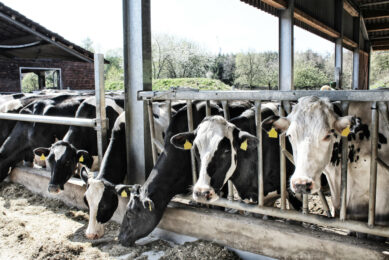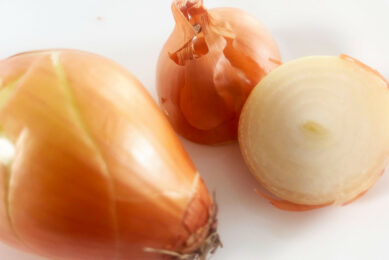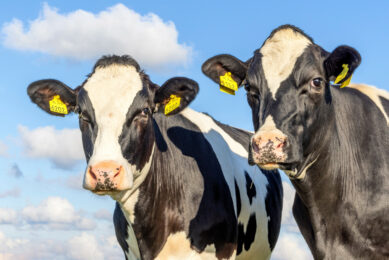Webinar on demand: Enhancing the health and performance of transition cows

The topic ‘Enhancing the health and performance of transition dairy cows with biological solutions’ was discussed in great detail during a recent webinar hosted by Dairy Global in cooperation with Novonesis. Did you miss it? This webinar is now available on demand!
Expert speakers at this webinar were Dr Ainhoa Valldecabres from Teagasc Animal & Grassland Research and Innovation Centre in Ireland, and Dr Bruno Cappellozza and Dr Kristian Witt from the Global Animal Business Unit at Novonesis.
This webinar looked at managing transition cows and the role of advanced nutrition strategies such as probiotics and silage inoculants, amongst other topics.

Dr Ainhoa Valldecabres
Presentation topic: The housed and intensively-grazed transition dairy cow
At the start of this webinar, Ainhoa looked at physiological, immunological and metabolic challenges faced by housed and intensively grazed transition dairy cows.
She started by sharing results of recent research focused on characterising the transition period in grazing cows. In terms of highest incidence of disease, which is during the transition period, “it’s not only affecting animal’s welfare but also has long-term implications on performance,” she said.
Regarding disease, she also discussed physiological aspects – subclinical hypocalcemia at calving, negative energy balance and inflammation. In looking at the health and performance of dairy cows during transition, she talked about 3 disorders, namely Dyscalmia, excess lipolysis and excessive inflammation, which leads to compromised animal welfare, productive efficiency and business profitability. She added that the disorders “are interrelated based on all the processes that they trigger”. She also spoke about dry matter intake in relation to transition disorders.

Dr Bruno Ieda Cappellozza
Presentation topic: Direct-fed microbial solutions to support transition dairy cows
He kicked off by stating that “transition dairy cows go through a lot of challenges and stressors and we need to find ways to support her”. In his presentation he focused on direct-fed microbial solutions to support transition dairy cows, specifically Bacillus-based direct-fed microbials. He discussed the stability of this in feed and stated that in terms of feed on-farm, “if you have a Bacillus-based direct fed microbial it’s gonna be there up to 6 months”.
Bacillus spp. are one of the species often used to support dairy cow health and productivity – this was highlighted during his presentation, also noting that Bacillus spp can produce different enzymes, which supports nutrient degradation in the rumen of cows. It is important to improve nutrient degradation at the rumen level, for benefits like dry matter intake, milk yield, fat corrected milk yield.
He also looked at Bacillus-based direct-fed microbials for transition cows and recent research that concluded that feeding Bacillus-based direct-fed microbials pre-partum and post-partum increased dry matter intake significantly. Also, milk yield was positively impacted as well as milk composition. Somatic cell count was also lower for Bacillus-fed cows compared to the control cows and the quality of colostrum was improved.

Dr Kristian Witt
Presentation topic: Enhancing dairy cow performance – the impact of SiloSolve FC-inoculated silage
Kristian gave some insights into Novonesis, including the history of the company as well as its focus areas. The presentation considered how we can improve the quality of silage and what impact that has on dairy cows in terms of health and nutrition. He talked about farm challenges, discussing optimal use of resources, feed efficiency and gut health. “It’s a very intensive period of time when you are making the silage when you are relying on quality.”
He mentioned: “SiloSolve FC can enhance fermentation quality of the forage and it can preserve the quality during feed-out so that there isn’t spoilage.”
He stressed that it is important to have optimal silage management, which improves silage quality, preserves nutritional value and supports health and performance of the animals.
In a recent trial, silage treated with SiloSolve FC showed aerobic stability improved, enhanced energy corrected milk and fat corrected milk yield and preserved dry matter. He noted that no negative impact was seen on body condition score or on performance during this delicate period of the [transition] cows.
“The take-home message is: we have tools available where we can utilise and bring more optimal use of resources. And it [SiloSolve FC] is a cost-effective solution for enhancing dairy cow performance.”
Join 13,000+ subscribers
Subscribe to our newsletter to stay updated about all the need-to-know content in the dairy sector, two times a week.










